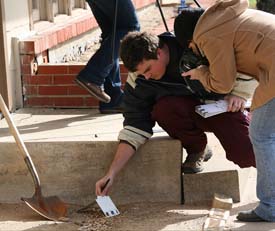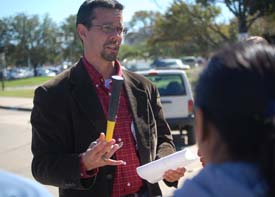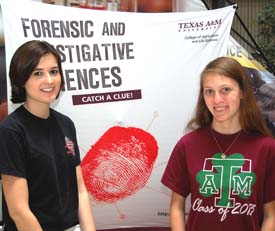
Alex Weghorst (left) lays a marker while Charity Owings takes a photo during a mock crime scene investigation for the Crime Scene Investigation course held by the TEEX’s Texas Forensic Science Academy in January.
The Forensic and Investigative Sciences program celebrated a milestone in its five-year history as the Forensic Science Education Programs Accreditation Commission (FEPAC) of the American Academy of Forensic Sciences announced full accreditation of the program for five years on February 18.
“To get to this point so quickly required vast foresight, persistence, and coordination by many administrators, faculty, staff, and students,” stated Dr. Kevin M. Heinz, Director of the FIVS Program. In the academic years immediately preceding the summer of 2006, Entomology majors within Forensic Entomology Track within the undergraduate Entomology degree program made known their desires to have an independent degree in forensics. After careful study, the Department of Entomology faculty voted to proceed with creation of a new undergraduate degree program in Forensic and Investigative Sciences.

Dr. Jeff Tomberlin demonstrating blunt force trauma during an Introduction to Forensic & Investigative Sciences class
“Texas A&M University did not have Texas Higher Education Coordinating Board authority to offer such a degree when we first started. The University, College of Agriculture and Life Sciences, and Department of Entomology (home to the FIVS degree) had to work in perfect unison starting from square one,” said Heinz.
In little more than a year from conception, the FIVS degree program received approval by the Texas Higher Education Coordinating Board in August 2007 following approvals at all levels of Texas A&M University and the Texas A&M University Board of Regents. The first class within the new degree was taught to 69 new students in Fall 2007.
What makes the Texas A&M University FIVS degree somewhat unique is its focus on the scientific foundations of discipline while at the same time providing a number of opportunities for students blend scientific knowledge with the practice of forensic science. Collaborations with one Texas A&M University System partner, “the Texas Engineering Extension Service Forensic Science Academy, as well as those with local, state, and federal agencies provide FIVS students opportunities to work side-by-side with practicing forensic professionals. All of these elements, together with and assessment of the number and quality of faculty, administrative support, and student placement are components evaluated during the accreditation process.

Sarah Bahlmann (left) and Bailey Harrington (right) work the Forensics table at 2011 Aggieland Saturday.
“Students graduating from an accredited program have an added assurance their education will assist them in establishing a career in forensic sciences by meeting the high requirements demanded by employers. More employers are looking to FEPAC programs as the gold standard for forensic science education as they know students from these programs will have received education in all necessary science courses. Graduates of the FIVS program will be the main benefactors of the FEPAC accreditation,” said Heinz.
Professor Dr. Jeff Tomberlin said having the certification is a great promotion tool to employers and prospective students.
“Receiving this certification represents a historic moment for the Forensic and Investigative Sciences Program at Texas A&M University. Our students can now rest assured that our program meets national standards,” Tomberlin said. “I am very thankful for the hard work by the administration, faculty, and staff associated with this degree. And, I am sure the future of our program will continue to be bright due to such continued efforts.”
Dr. David Ragsdale, department of entomology head, said the accreditation should benefit students beginning with May 2012 graduates.
“We want to celebrate the accomplishment of accreditation as it is truly something the students, staff, faculty and administration should be proud of,” Ragsdale said.